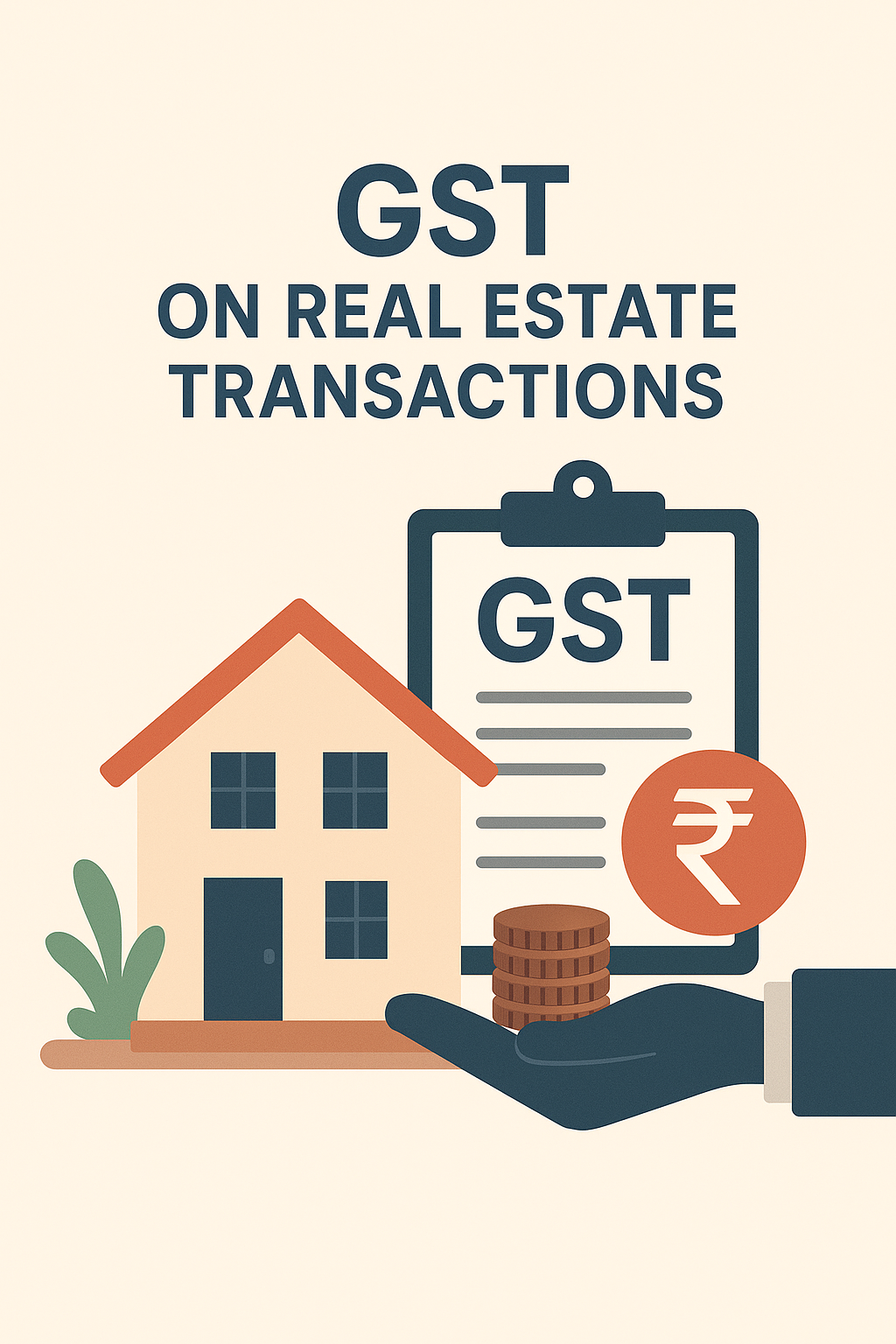GST on Real Estate Transactions: Understanding Works
Contracts, Affordable Housing, and ITC Restrictions
Introduction
The Indian real estate sector has always been a cornerstone of the economy, but also one of
the most litigated when it comes to taxation. Before GST, developers and buyers struggled
with a maze of indirect taxes such as VAT, service tax, excise duty, and entry tax, often
leading to double taxation. The introduction of the Goods and Services Tax (GST) in 2017
promised clarity and uniformity. However, real estate, especially under-construction
properties, continues to face unique challenges under GST. This blog explores how GST
applies to real estate transactions, particularly works contracts, affordable housing projects,
and the restrictions placed on Input Tax Credit (ITC).
GST and Works Contracts
A works contract under Section 2(119) of the CGST Act is treated as a supply of services.
This classification was significant because under the earlier regime, works contracts were
subject to both VAT (as deemed sale of goods) and service tax (as provision of services).
Under GST, works contract services provided to government authorities for infrastructure
projects are generally taxed at concessional rates, while private developers face 18% GST,
though effective rates may vary depending on notifications. This has simplified taxation but
disputes remain, particularly on whether finishing or fit-out activities qualify as independent
contracts or integral to construction.
GST on Sale of Under-Construction Property
One of the most debated issues in real estate is the sale of under-construction property.
Completed properties (with an occupancy certificate) are exempt from GST, but underconstruction properties attract GST at 5% without ITC for residential projects and 1%
without ITC for affordable housing. These rates were introduced by the GST Council in 2019
to address concerns of high tax burdens on home buyers. Earlier, GST was levied at 12% with
ITC, but developers often failed to pass on the benefit to consumers. The reduced rates came
as relief to buyers but denying ITC has had its own consequences.
Affordable Housing and Concessional Rates The government’s policy on affordable housing aims to encourage home ownership among
lower and middle-income groups. GST law provides a concessional 1% rate without ITC for
affordable housing projects, defined by size and price thresholds. While this reduction
benefits end buyers by lowering costs, developers argue that the denial of ITC increases their
construction expenses, which may eventually be factored into the pricing of homes. Thus,
while consumers see short-term benefits, the sector faces long-term concerns regarding
viability and reduced incentives for developers.
Input Tax Credit Restrictions
The denial of ITC to developers is perhaps the most controversial feature of GST in real
estate. Section 17(5) of the CGST Act already restricted ITC on certain construction-related
goods and services. With the 2019 amendments, developers opting for reduced GST rates
cannot claim ITC at all. This has led to two major problems. First, cascading of taxes since
GST paid on inputs like cement and steel cannot be set off, raising overall costs. Second,
transparency concerns since the earlier promise of seamless ITC under GST has been
compromised, affecting both developers and buyers.
Judicial Developments
Courts have intervened in certain cases to highlight these contradictions. In Safari Retreats
Pvt. Ltd. v. Chief Commissioner of CGST (Orissa High Court, 2019), the court allowed ITC
on the construction of shopping malls intended for renting, observing that denial of ITC
defeated the purpose of GST as a value-added tax. This case is now pending before the
Supreme Court, and its outcome could reshape the law for real estate developers. Advance
Rulings have also dealt with disputes regarding whether certain real estate activities
constitute “construction services” or “renting of immovable property,” reflecting ongoing
uncertainty in the sector.
Challenges in Implementation
Despite the simplified GST framework, the real estate industry continues to face hurdles.
Denial of ITC increases costs for developers, frequent notifications and circulars create
confusion, and refund delays especially in mixed projects with residential and commercial
units add to financial strain. Further, disputes on whether a transaction is the sale of land
(outside GST) or a supply of service (taxable) remain unresolved, leading to litigation.
Global Perspective Internationally, many countries have adopted different approaches. In the European Union,
new buildings are subject to VAT while the sale of old properties is exempt, but developers
can claim input VAT credit. In Australia, GST applies to the sale of new residential property
with full input credit allowed to builders. Singapore too exempts sale of completed property
but permits developers to claim input GST. India’s denial of ITC makes it an outlier among
major jurisdictions, raising concerns about competitiveness and compliance with the valueadded principle of GST.
Critical Analysis and Way Forward
While concessional GST rates on housing have made homes more affordable for buyers, the
blanket denial of ITC has undermined the fundamental principle of GST as a credit-based
system. Developers face higher costs, which in the long run could reduce supply and increase
prices. A balanced approach is needed. Possible reforms include allowing partial ITC for
developers subject to clear pass-through of benefits to buyers, creating a single-window ITC
reconciliation mechanism, and aligning India’s framework with global practices where ITC is
available but strictly monitored.
Conclusion
The GST regime has brought some clarity to real estate taxation but several issues remain
unresolved. The reduced rates on under-construction and affordable housing projects have
provided relief to buyers but increased the financial burden on developers. Restoring ITC
benefits in some form, while ensuring accountability and transparency, may provide a fairer
balance. For GST to truly function as a seamless value-added tax, reforms in the real estate
sector are essential.
References
1. Central Goods and Services Tax Act, 2017 – Sections 2(119), 17(5).
2. GST Council Notifications (2019) on real estate rates.
3. Safari Retreats Pvt. Ltd. v. Chief Commissioner of CGST, Orissa High Court (2019).
4. OECD, International VAT/GST Guidelines (2017).
5. CBIC FAQs on Real Estate under GST (2019).
DEVYANI SEMWAL
LOVELY PROFESSIONAL UNIVERSITY



